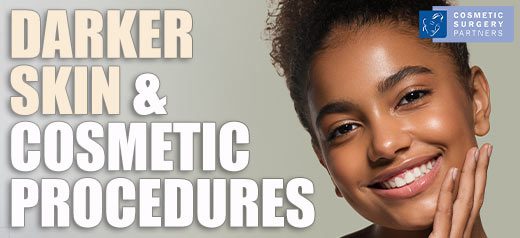Things to consider for patients with darker skin

Although humans share fundamental anatomical similarities, skin colour exists on a spectrum ranging from pale to dark. In the aesthetic world, an useful numerical classification has been provided by Fitzpatrick. It extends from Type I to VI where I is typified by the palest, Celtic-type skin than never tans and burns easily. At the other end of the scale, VI is deeply pigmented and never burns. It was originally developed to gauge burn-ability of the skin. The pigmentation of skin is determined by the quantity of melanin. Whilst we share similar numbers of the melanin-producing cells (melanocytes), the absolute amount of the pigment, melanin, increases with the intensity of colour. Melanin’s prime benefit is protection against the damaging effects of the sun’s UV rays, known as photoaging. Its predominant downside is post-inflammatory hyperpigmentation (PIH) which is a consequence of overactive melanocytes in response to trauma which includes sun exposure.
Each Type has its own characteristics with respect to photosensitivity, ageing and topical treatments. Historically, darker skin hues have received little attention in standard texts so most treatments have been pioneered with lighter skin types. Darker skin types therefore present their own unique challenges and patients with darker skin often have different concerns, particularly with regard to discolouration and marks.
PIH – post-inflammatory hyperpigmentation
Dark skin is rich in melanin with melanocytes that are more active thereby making it more susceptible to pigmentary changes.
The causes of post-inflammatory hyperpigmentation are multi-factorial, including genetics, hormones and trauma. The latter may be as simple as sun exposure and trauma such as acne or burns.
On the other hand, darker skin offers superior protection against the damaging effects of UV radiation and is helpful for concealing conditions that present as redness and pinkness, for example rosacea, that are more easily seen in lighter skin.
Are non-surgical treatments safe for persons with skin of colour (SOC)?
In essence, yes. Being a complex mass of trade names and descriptors, we understand the need for clarity on this topic. The predominant non-surgical/injectable treatments are botulinum neurotoxin (Botox™) and dermal fillers which both tend to work in a broadly similar fashion. Botulinum specifically targets the muscles of facial expression whilst fillers are situated subdermally so both are deep to the skin. Most now understand that the majority of dermal fillers are based on hyaluronic acid (HA), a naturally-occurring component of human skin.
Our surgeon Mr Miles Berry Publishes a book on Botox available on Amazon, click to learn more
A new category of injectables is bio-stimulators, for example PLLA (poly-L lactic acid) but this has not taken hold primarily because of the lengthy time for results to appear. The latest approach is a new category of skin remodelling agents, the best known being Profhilo.
Profhilo is an injectable that provides plumping. It provides intense hydration via the delivery of stable hyaluronic acid which then stimulates the production of collagen and elastin, thus optimising facial structure. It involves two sittings over a four week period and results are typically apparent within a few weeks.
What are the management options for skin hyperpigmentation?
Hyperpigmentation can occur in any skin type but arguably needs a more careful approach in Fitzpatrick types IV to VI.
The initial treatment should always begin with topical medical grade skincare, as this may be the only step required or at the very least, it will prepare the skin for the next steps.
Baseline maintenance & defence for all skin types should include vitamin C, antioxidants and SPF, all of which must be applied daily.
In addition to these, hydroquinone or arbutinin may be added to achieve skin brightening and lightening in order to even up skin tone and colour, thus minimising the unwanted effects of hyperpigmentation.

The next interventional strategies would be chemical peels and laser – the latter generally provided at specialist centres due to the higher degree of potential complications.
Are laser and light treatments safe for darker skin?
Some cosmetic laser treatments can create pigmentation problems with darker skin, mostly because dark skin absorbs more heat.
Intense pulsed light devices are known to cause complications. For example, the suitability of laser resurfacing depends on the laser.
A consultation is always best to ensure that your skin’s correct treatment is specified. Never get a laser treatment without a consultation. Our highly accredited dermatologist Dr Sweta Rai is a specialist in understanding and advising patients with darker skin, learn more about skin care consultations at our clinic.
Are surgical treatments safe for dark skin?
Invasive surgical procedures are generally safe for darker skin, however, those with more heavily pigmented skin should be counselled carefully due to the increased risk of hypertrophic or keloid scar formation. The former refers to a scar that is larger than ideal but confined to the boundaries of the original wound. Keloid scars are those which extend well beyond the original wounds and both may be troublesome and difficult to treat.
When to seek specialist advice
As skincare specialists – dermatologists and surgeons – we actively study darker skin to provide the best treatment for all patients..
If you are considering dermatological, non-surgical or surgical procedure and have darker skin, you should only approach practices that have experience treating darker skin.
A consultation is the first step. Meet our team of skilled professionals and book your consultation today.
Article by surgeon Mr Miles Berry







